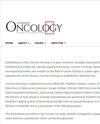Association of Cancer with Heart Failure and the Prognostic Value of NT-proBNP in Cancer Patients: Findings from the NHANES (1999–2018)
IF 2.8
4区 医学
Q2 ONCOLOGY
引用次数: 0
Abstract
Evidence regarding the association between cancer and heart failure (HF) is scarce. This study is to investigate the association between HF and cancer and explore the prognostic value of NT-proBNP in cancer patients. This cohort study used National Health and Nutrition Examination Survey data from 1999 to 2018 and linked mortality information until 2019. We included all participants with valid answer to questions regarding self-reported cancer and HF. Multivariable logistic regression was used to estimate odds ratios (ORs) and 95% CIs. Our study included data from 54,847 adult participants. During a median (IQR) follow-up of 9.6 (4.0–15.1) years, 7674 deaths were recorded. HF was associated with an increased occurrence of cancer after propensity score matching (OR = 1.46, 95% CI: 1.17–1.82, p < 0.001). Cancer was associated with a higher occurrence of HF (OR = 1.33, 95% CI: 1.11–1.59, p = 0.002). Kaplan–Meier survival analysis over 10 years revealed the shortest survival in patients with both HF and cancer (log-rank p < 0.0001). Importantly, NT-proBNP was significantly higher in cancer patients, no matter whether with known HF (p < 0.01). In cancer patients without HF, NT-proBNP higher than 51.51 pg/mL was associated with shorter survival (log-rank p < 0.0001). Findings from this cohort study suggest that HF is significantly associated with cancer. NT-proBNP was higher in cancer patients, with significant prognostic value in cancer patients.癌症与心力衰竭的关联以及癌症患者 NT-proBNP 的预后价值:国家健康调查(NHANES)(1999-2018 年)结果
有关癌症与心力衰竭(HF)之间关系的证据很少。本研究旨在调查 HF 与癌症之间的关联,并探讨 NT-proBNP 在癌症患者中的预后价值。这项队列研究使用了 1999 年至 2018 年的美国国家健康与营养调查数据,并链接了截至 2019 年的死亡率信息。我们纳入了所有对自我报告的癌症和高血压问题做出有效回答的参与者。多变量逻辑回归用于估算几率比(OR)和 95% CI。我们的研究纳入了 54847 名成年参与者的数据。在中位数(IQR)为 9.6(4.0-15.1)年的随访期间,共记录了 7674 例死亡。经过倾向得分匹配后,高血压与癌症发生率增加有关(OR = 1.46,95% CI:1.17-1.82,p < 0.001)。癌症与较高的心房颤动发生率相关(OR = 1.33,95% CI:1.11-1.59,p = 0.002)。Kaplan-Meier 10 年生存分析显示,同时患有心房颤动和癌症的患者生存期最短(log-rank p < 0.0001)。重要的是,无论是否患有已知的心房颤动,癌症患者的 NT-proBNP 都明显升高(p < 0.01)。在无心房颤动的癌症患者中,NT-proBNP高于51.51 pg/mL与生存期缩短有关(对数秩p < 0.0001)。这项队列研究的结果表明,心房颤动与癌症密切相关。癌症患者的 NT-proBNP 较高,对癌症患者的预后具有重要价值。
本文章由计算机程序翻译,如有差异,请以英文原文为准。
求助全文
约1分钟内获得全文
求助全文
来源期刊

Current oncology
ONCOLOGY-
CiteScore
3.30
自引率
7.70%
发文量
664
审稿时长
1 months
期刊介绍:
Current Oncology is a peer-reviewed, Canadian-based and internationally respected journal. Current Oncology represents a multidisciplinary medium encompassing health care workers in the field of cancer therapy in Canada to report upon and to review progress in the management of this disease.
We encourage submissions from all fields of cancer medicine, including radiation oncology, surgical oncology, medical oncology, pediatric oncology, pathology, and cancer rehabilitation and survivorship. Articles published in the journal typically contain information that is relevant directly to clinical oncology practice, and have clear potential for application to the current or future practice of cancer medicine.
 求助内容:
求助内容: 应助结果提醒方式:
应助结果提醒方式:


